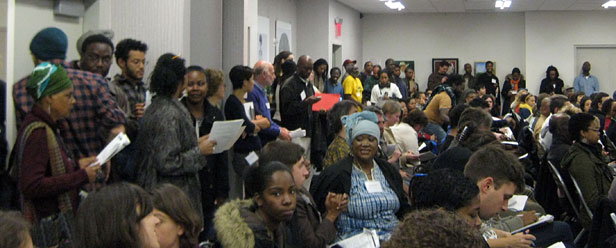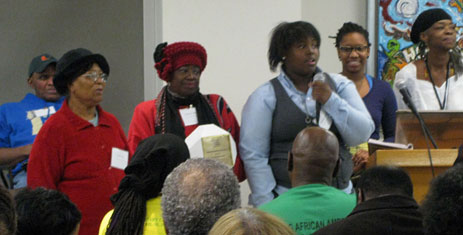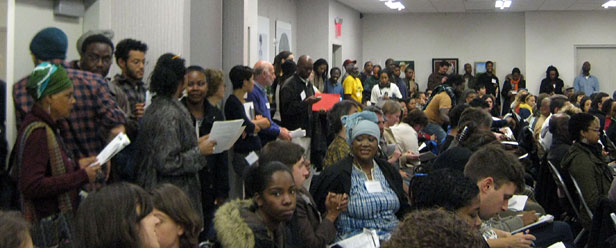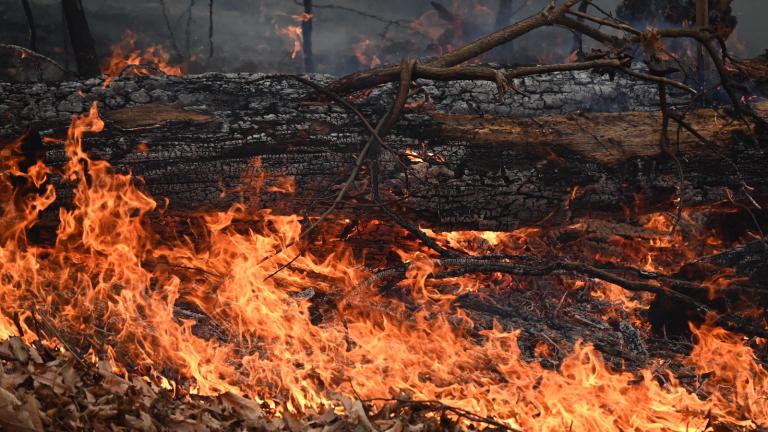 Attendees at the Black Farmers ConferencePhotos: Natasha Bowens
Attendees at the Black Farmers ConferencePhotos: Natasha Bowens
The Color of Food series is about my experiences searching for black and Latino farmers in the sustainable food movement.
On the same day black farmers gathered in Brooklyn for the first annual Black Farmers Conference, the Senate finally voted to award $4.5 billion in damages to African American and Native American farmers for discrimination. The long-awaited settlement funding — three decades in the making — was an outgrowth of the Pigford vs. Glickman class action suit over how processing times for loans to black farmers from a long-ago U.S. subsidy program had far exceeded those for white farmers.
Nice coincidence. But as attendees of this conference know, there’s still a long road ahead to end discrimination, and to fight for land and the right to grow healthy food.
The day kicked off at 8:30 a.m. in the Student Center of Brooklyn College, with black farmers from the South, urban growers from the North, and the food activists from all over signing in, checking their coats and snacking on locally grown apples while waiting for the program to begin. Most are used to being one of the 15 or so people of color at the typical 1,000-person farming conference, so it was empowering to be surrounded by more than 500 others, ready to discuss issues pertinent to our community.
 Cameal, youth intern from ENYFarms, gives thank-you speech for award as Will Allen and others look on.The energy in the room was thick. Two of the most prominent black leaders in the food movement, Karen Washington of New York City (who I mentioned in my piece about NYC’s food justice movement) and Will Allen of Growing Power in Milwaukee, Wisc. opened the conference.
Cameal, youth intern from ENYFarms, gives thank-you speech for award as Will Allen and others look on.The energy in the room was thick. Two of the most prominent black leaders in the food movement, Karen Washington of New York City (who I mentioned in my piece about NYC’s food justice movement) and Will Allen of Growing Power in Milwaukee, Wisc. opened the conference.
Allen comes from a long line of farmers, with over 400 years of farming in his family since sharecropping days. He left his career as an NBA player to farm again. (Read Grist’s 2009 interview with Allen.)
“Many of us in this room have these roots,” Allen said, “and we need to pass them on.”
When Allen came up to the podium, the crowd gave him a standing ovation and began chanting his name. Which was maybe more suited for a basketball arena than a farmers conference, but it was clear that everyone in the room respected what Allen has done for the movement, including me: I’ve looked up to the work of Growing Power since I began immersing myself in sustainable urban agriculture.
Allen gave a presentation on Growing Power’s history, current productions, and future plans. The only organization of its kind led by a black man, Growing Power has 52 employees, 39 goats, 500 hens, and 19 beehives. And that’s just a tiny portion of the work they do. I was blown away by the sheer scale of the farms’ production and the program’s projects, including their enormous composting facilities and innovative aquaculture centers. Allen spends much of his time traveling around the country, as well as internationally to places like Kenya or the Ukraine, to help other urban growers set up shop and begin training future urban farmers through their Regional Outreach Training Center program.
Allen spoke about the harsh reality he sees every day, with farms shutting down due to lack of funding or loss of land. “It’s one thing to be at conferences and doing assessments,” he said. “Now it’s time to go into action.”
After Allen, the high school interns from East New York Farms! in Brooklyn, where I’d previously volunteered for two months, took the podium to receive their George Washington Carver Award. (Other awards were presented to People’s Grocery for their food justice work in Oakland, Calif. and to Afrikan Zion Organic Roots Farm in Vermont for their work with such NYC neighborhoods as Bushwick, Harlem, and Bedford Stuyvesant.)
“It’s inspiring to be here and see that we have people to look up to,” said Cameal, a 16-year-old intern. “In my three years [doing this work] I went from learning the ropes to teaching the ropes — so, thank you.”
There were multiple breakout sessions to choose from. I checked out “Reclaiming and Reframing Black Farmers’ History in the U.S.” with cultural anthropologist Dr. Gail Myers, who spoke about how Africans and African practices survived on slave plantations and served as the foundation of much of America’s first agricultural successes, like the early rice economy in South Carolina. I also attended “The People’s Struggle for Food Sovereignty: From Local to Global,” and heard from members of La Via Campesina and The National Family Farm Coalition, represented by Ben Burkett, a black farmer from south Mississippi.
The afternoon panel on the Pigford case against the USDA, however, was by far the most powerful portion of the day. The statistics highlighting the disparities in wealth, land tenure, and farm sales between white farmers and black farmers (according to Dr. Spencer Wood, in 1992 all farm sales declined by 12 percent, but black farm sales declined by 46 percent) made the white people in the room gasp and the black people nod with a tired affirmation of old news.
Gary Grant, president of the Black Farmers & Agriculturists Association, was the one to point out that on this very day the Pigford funding had finally been passed through the Senate, but that we still have a long way to go to end discrimination for black farmers.
“You can talk about urban gardening and food justice all you want, but it’s not going to happen if the USDA is supposed to be the People’s Department [which is what Abraham Lincoln called it]. We have to take the department back for the people,” Grant said, with loud support from all of us in the room.
Grant spoke about his personal struggle with his family’s land, as well as how this settlement money for black farmers will now be reported to the IRS, so that the farmers who were discriminated against by the government will now have to pay taxes to the government on the money they were given as a “sorry” for that discrimination. Tell me how that makes any sense?
He also spoke to those of us who don’t live in the South about how alive racism still is there, especially for farmers. He painted a clear picture of how some of these regional USDA offices have Confederate flags and lynch nooses hanging on their walls. That sends an undeniable message to any black farmer walking in the door asking about why their loan is delayed. He also noted how during a black farmers event this past summer in Tillery, N.C., crop dusters buzzing overhead disrupted the event all day long.
“Racism will not end in this country u
ntil black farmers are healed,” said Grant.



